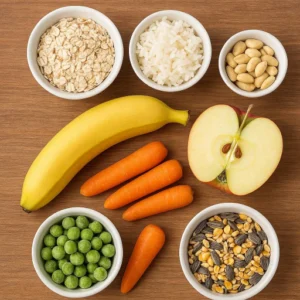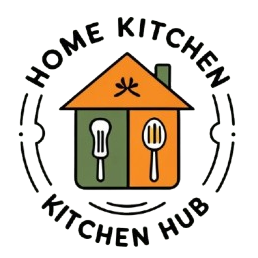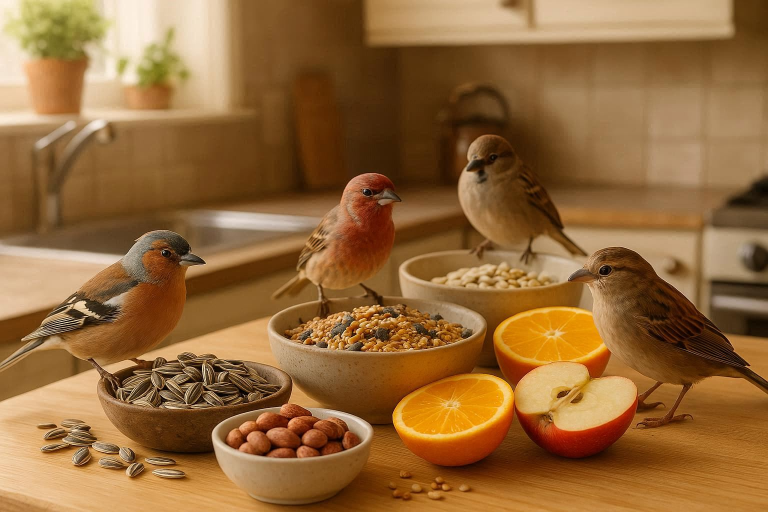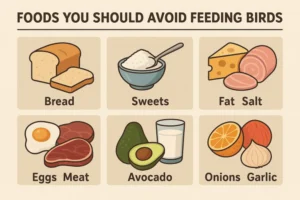If you’re someone who loves birds and wants to help them thrive, you might be wondering how you can feed them. While store-bought bird food is convenient, you may not know that you can easily use ingredients right from your kitchen to feed your feathered friends. Not only is it cost-effective, but it can also be incredibly nutritious. Homemade bird food can offer a variety of tasty treats that benefit their health, while also attracting a wide range of bird species to your yard. In this guide, we’ll explore what kitchen foods are safe and beneficial for birds, as well as foods to avoid.
Why It’s Important to Feed Birds from the Kitchen
Feeding birds from the kitchen is not only a way to help them out, but it also comes with a variety of benefits that you might not have considered. Here are some reasons why feeding birds kitchen ingredients is a good choice:
Benefits of Feeding Birds Healthy Foods
Birds, like all creatures, need a balanced diet to thrive. Offering them healthy foods from your kitchen can:
- Improve Bird Health and Lifespan: Providing nutritious foods helps birds stay healthy and can even extend their lifespans. For instance, fruits like berries provide antioxidants that help maintain a bird’s immune system.
- Support the Local Ecosystem and Attract Diverse Bird Species: When you feed birds in your area, you’re supporting the local ecosystem. Not only will you attract a variety of species to your garden, but you’re also playing an important role in maintaining biodiversity.
Environmental Impact of Homemade Bird Food
Switching from store-bought bird food to ingredients you already have in your kitchen can make a difference in reducing your environmental impact.
- Reduces Reliance on Store-Bought Birdseed: Many store-bought bird foods are filled with fillers and unnecessary additives. By using kitchen ingredients, you’re ensuring your bird food is pure and free from unwanted chemicals.
- Eco-Friendly and Sustainable: Homemade bird food is more eco-friendly as it reduces packaging waste and doesn’t require the transportation of pre-packaged foods. It’s a win for both the birds and the planet.

Tasty and Healthy Foods You Can Feed Birds from Your Kitchen
Now that you know the benefits, let’s dive into what kinds of foods from your kitchen can help nourish birds and keep them coming back for more. The key is to provide a variety of Choosing Cookware Sets foods to keep your feathered friends happy and healthy.
Fruits: A Sweet Treat for Your Feathered Friends
Birds love fruits! They’re packed with essential nutrients and sugars that give birds energy. Here are a few bird-friendly fruits you can easily offer from your kitchen:
- Apples: Cut into small, manageable pieces, apples are full of fiber and vitamins that are great for birds.
- Pears: Another excellent choice, pears are a juicy and nutritious treat.
- Grapes: Birds love grapes, but be sure to cut them into halves to avoid any choking hazards.
- Bananas: A great source of potassium, bananas should be served in small pieces to prevent mess and waste.
Berries are also a fantastic choice for birds. Blueberries, strawberries, and raspberries are rich in antioxidants and will help keep your feathered friends hydrated while adding a burst of color to your garden.
Vegetables: Nourishing and Full of Nutrients
Vegetables are another essential food group that benefits birds in many ways. They’re full of vitamins, minerals, and fiber that help with digestion. Here are some great vegetable options:
- Carrots: Shredded or chopped into small pieces, carrots are rich in vitamin A and good for birds’ vision and immune system.
- Leafy Greens: Birds love leafy greens like spinach and kale, which are packed with vitamins and antioxidants.
- Broccoli: Steamed or raw, broccoli is an excellent source of fiber and essential vitamins.
- Corn: Birds love corn, and whether it’s fresh, cooked, or frozen, it’s a wonderful addition to their diet.
These vegetables are especially beneficial in supporting a bird’s digestive health, helping them process food efficiently.
Grains and Seeds: Bird-Friendly Kitchen Staples
You can also provide grains and seeds, which are staples for many types of birds. These ingredients are packed with fiber and carbs, giving birds much-needed energy throughout the day.
- Oats: Rolled oats are easy for birds to eat and are high in fiber. You can serve them raw or cooked.
- Rice: Cooked rice is an excellent choice. It’s easy to digest and offers carbohydrates for energy.
- Quinoa: Quinoa is rich in protein and amino acids. It’s an excellent choice for a more balanced diet.
- Whole-Wheat Bread Crumbs: While bread should be served sparingly, whole-wheat bread crumbs can be used occasionally, as they contain fiber and nutrients.
When offering grains, remember that variety and moderation are key. Overfeeding any one type of food can cause imbalances in a bird’s diet.
Nuts and Nut Butters: Protein-Rich Delights
Nuts are a fantastic source of protein, essential fats, and vitamins, which support healthy feathers, beaks, and bones. Some bird-friendly nuts to offer include:
- Sunflower Seeds: These seeds are packed with healthy fats and oils.
- Peanuts: Unsalted peanuts are an excellent choice but should be offered in moderation.
- Almonds: High in protein, almonds also provide healthy fats that support bird energy levels.
- Walnuts and Hazelnuts: Like almonds, these nuts are protein-rich and beneficial for birds’ health.
Nut butters are also a great option, but make sure they’re unsweetened and free from added oils or preservatives.
Cooked Foods Birds Will Love
Believe it or not, birds enjoy cooked foods too! These foods are easy to digest and provide essential proteins.
- Scrambled Eggs: Birds love scrambled eggs. They’re a great source of protein and fats, which are crucial for feather growth and overall health.
- Plain Cooked Pasta: Birds can safely eat plain pasta, which is easy to digest and can be served in small pieces.
- Cooked Rice: Whether served alone or mixed with other foods, cooked rice is easy for birds to digest and is packed with carbohydrates.
Foods You Should Avoid Feeding Birds from the Kitchen
Not all kitchen foods are safe for birds, and some can actually harm them. Be sure to avoid the following:
Dangerous Foods That Can Harm Birds
- Chocolate: Chocolate contains theobromine, which is toxic to birds. It can cause seizures, heart problems, and even death.
- Avocado: While delicious for humans, avocado contains persin, a toxin that can lead to respiratory distress and heart failure in birds.
- Onions and Garlic: These can cause digestive issues and even damage red blood cells, leading to anemia.
Processed and Salty Foods
Processed foods, such as chips, cookies, or any other junk food, should also be avoided. These foods are loaded with salt, preservatives, and artificial flavorings that can harm birds’ health.
Bread, particularly white bread, is another food to avoid giving birds, as it offers little nutritional value and can lead to malnutrition when consumed in large quantities.
How to Prepare and Serve Kitchen Foods for Birds
When feeding birds from your kitchen, preparation and presentation matter.
Cutting and Preparing Ingredients Safely
- Always chop fruits and vegetables into small, bird-sized pieces to prevent choking.
- Remove any pits, seeds, and stems from fruits like apples, peaches, and cherries, as they can be harmful to birds.
How to Serve: Bird-Friendly Feeding Stations
You can serve the food in various ways, such as:
- Bird Feeders: Use a simple hanging feeder or a platform feeder.
- Dishes: Place the food in shallow dishes or trays.
- Platforms: Create feeding stations on platforms for a wider variety of foods.
Best Practices for Bird Feeding Times
- Feed your birds early in the morning and in the late afternoon when birds are most active.
- Adjust your feeding schedule based on the season. For example, birds may need more food in the winter when natural food sources are scarce.
Common Mistakes to Avoid While Feeding Birds from the Kitchen
Overfeeding and the Risk of Obesity
While it’s tempting to feed birds plenty, overfeeding can lead to obesity. Make sure to serve appropriate portion sizes and balance high-calorie foods like nuts with lighter options like fruits and vegetables.
Ignoring Hygiene in Feeding Areas
Bird feeders and dishes can become contaminated quickly. Clean your feeders regularly to prevent mold and bacteria growth. This will help keep your birds healthy.
Not Providing Enough Water
Birds need access to fresh, clean water at all times. Be sure to place a birdbath or shallow dish of water near their food station.
FAQ Section
Can I feed birds bread from the kitchen?
While it’s okay to give birds a small piece of bread occasionally, avoid white bread, as it lacks nutritional value and can lead to malnutrition if fed regularly.
Is it okay to feed birds seeds like sunflower seeds?
Yes! Sunflower seeds are great for birds, but they should be given in moderation, as they are high in fats.
Can birds eat bananas?
Absolutely! Bananas are a great source of vitamins and minerals for birds, but be sure to offer them in small pieces to avoid waste.
Why should I avoid feeding birds chocolate?
Chocolate contains theobromine, a substance toxic to birds. It can lead to serious health issues such as seizures, digestive problems, and even death.
How often should I feed birds in my backyard?
The frequency depends on the season. During the colder months, birds may require more food, while in warmer months, they can often find natural food sources. Aim to feed them once or twice a day.
Are there any birds that can’t eat certain kitchen foods?
Yes, some species of birds have specific dietary needs. For example, parrots need a diet different from finches. Always research the dietary requirements of the bird species you’re feeding.
Conclusion
Feeding birds from your kitchen is a fantastic way to help support local wildlife while also keeping your feathered friends healthy. By offering a variety of fruits, vegetables, seeds, nuts, and even cooked foods, you can ensure that your birds get a balanced, nutritious diet. Just be sure to avoid dangerous foods and maintain good hygiene around your feeding stations.
Now that you know what to feed birds from your kitchen, it’s time to get started! Share this guide with your friends and let them know how they can make a difference in their community by providing healthy, homemade bird food. Don’t forget to comment below and tell us which kitchen foods your birds love the most!


